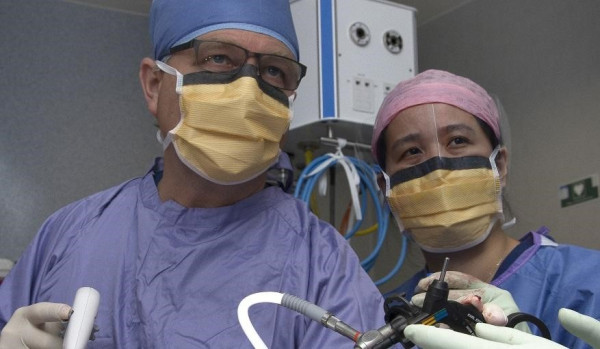Colorectal cancer
Colorectal cancer is the most commonly registered cancer in New Zealand with 3000 cases diagnosed every year and more than 1200 deaths per annum. New Zealand has a 5 year survival rate significantly lower than that in Australia.
The low survival rate has been attributed to differences in both diagnosis and treatment. For example, New Zealand has a low proportion of patients diagnosed with stage 1 disease. Furthermore, 34% of New Zealand patients with colon cancer present to the emergency department (ED) as mode of first presentation, with 44% of Māori presenting this way. Delay in diagnosis is deemed to be a major cause of poor survival and inequity for Māori. Factors that delay diagnosis can be patient or health system related. Part of the delay may be in patients not recognising their symptoms as being important and requiring assessment by a health care professional. Delay can also occur in primary care if signs and symptoms are not recognised as cancer related.
Delay in diagnosis is deemed to be a major cause of poor survival and inequity for Māori. Factors that delay diagnosis can be patient or health system related. Part of the delay may be in patients not recognising their symptoms as being important and requiring assessment by a health care professional. Delay can also occur in primary care if signs and symptoms are not recognised as cancer related.
Reducing delay and increasing access to early diagnosis for colorectal cancer.
Final Report
This study was conducted over three years to look at how to reduce delays in the diagnosis of colorectal cancer. We believe that given the high incidence of colorectal cancer in New Zealand, high mortality rate and the generally late presentation at diagnosis, there is potential to improve health outcomes by identifying and addressing causes of delays to a colorectal cancer diagnosis.
Findings of the project highlight
- Patients identified by general practitioners (GPs) as having a high suspicion of colorectal cancer had a 9% chance of having an underlying colorectal cancer
- Raised platelet count, in addition to iron deficiency anaemia is predictive of an underlying colorectal cancer
- There is a need to increase public awareness of the signs and symptoms of colorectal cancer: alarm or abnormal symptoms facilitate help-seeking, but symptoms considered as ‘normal’ by patients, such as constipation, do not
- The patient-GP relationship and the role of the GP is critical to patients in the diagnostic process
- Māori patients experience greater diagnostic delay
- Māori patients are less likely to receive a colonoscopy
Project partners
This project was conducted in conjunction with the Waikato District Health Board, the University of Auckland, the University of Otago and the Ministry of Health. We acknowledgement and thank Health Research Council for funding this project.
Recent publications
- Blackmore T, Lao C, Chepulis L, Page B, Lawrenson R. The characteristics and outcomes of patients with colorectal cancer in New Zealand, analysed by Cancer Network. NZ Med J. 2020 Apr 24; 133(1513):42-52.
- Lao, C., Kuper-Hommel, M., Laking, G., Chepulis, L. and Lawrenson, R., 2020. Evidence of inequitable use of chemotherapy in New Zealand colorectal cancer patients. The New Zealand Medical Journal, 133(1520), pp.15-26.
- Sharples KJ, Firth MJ, Hinder VA, Hill AG, Jeffery M, Sarfati D, Brown C, Atmore C, Lawrenson RA, Reid PM, Derrett SL, Macapagal J, Keating JP, Secker AH, De Groot C, Jackson CG, Findlay MP. The New Zealand PIPER Project: colorectal cancer survival according to rurality, ethnicity and socioeconomic deprivation-results from a retrospective cohort study. NZ Med J. 2018 Jun 8; 131(1476):24-39.
Publications currently in review
- Firth, M., Blackmore, T., Chepulis, L., Keenan, R., Stokes, T., Weller, D., Emery, J., Lawrenson, R. Why does NZ have such poor outcomes from colorectal cancer – the problem of late diagnosis? 2021 Journal of Primary Health Care
- Blackmore T., Chepulis L., Keenan, R., Kidd, J., Emery J., Weller D., Stokes T., Lawrenson R. How do colorectal cancer patients rate their GP? 2021 BMC Family Practice
- Lawrenson, R, Moosa, S, Warren, J, van Dalen, R, Chepulis, L, Blackmore, T, Lao, C, Mayo, C, Kidd, J, Firth, M, Stokes, T, Elwood, M, Weller, D, Emery, J. Outcomes from colonoscopy following referral from New Zealand general practice
- Blackmore, T.L., Chepulis, L., Keenan, R., Kidd, J., Stokes, T., Firth, M., Elwood, M., Jackson, C., Weller, D., Emery, J., Lawrenson, R. Patient reported delays to diagnosis of colorectal cancer patients in the Midland region of New Zealand, Family Practice